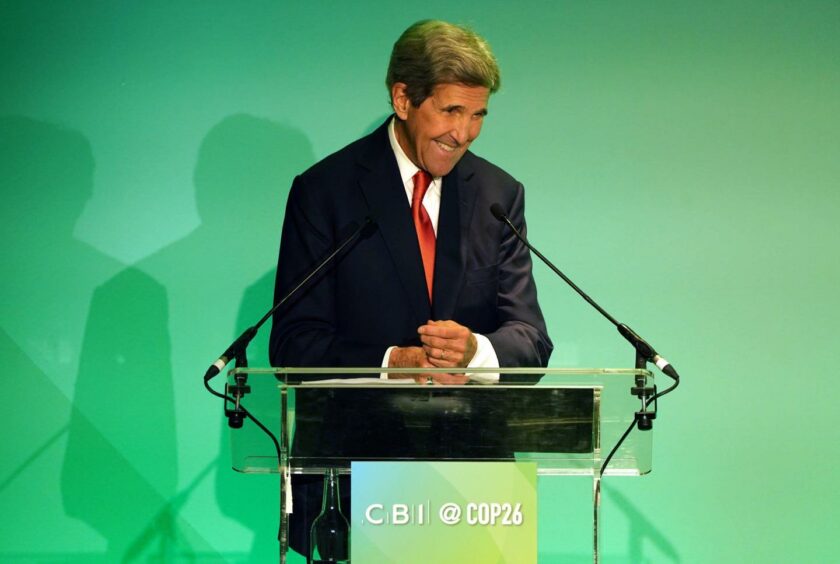
Richer nations will be able to deliver 100 billion dollars of climate finance to developing countries every year from 2022 – a year earlier than expected, US envoy John Kerry has said.
He said the countries would be able to reach the target – which was agreed in Paris – next year, despite recent estimates that suggested it would have to wait until 2023.
Speaking at a dinner hosted by the Confederation of British Industry (CBI) alongside the Cop26 conference, Mr Kerry said: “No Cop in history has had the feel of what I feel in Glasgow here today – new energy, new urgency, a new sense of possibility, and we have never had as much corporate presence and commitment as we have today.”
“I believe that we are going to be able to raise the ambition beyond anything we imagined – already we have finance that is very significant.”
He said that Japan had promised to pay two billion dollars a year for the next five years.
This would unlock another eight billion dollars every year in loans from banks and other private organisations, he added.
“That means for 2022 we now have the full 100 billion dollars we wanted to have, and 100 billion going forward, so we take that issue off the table and that changes the dynamics.”
But he warned that “no government in the world has enough money” to cope with climate change, and that trillions in private finance needs to be unlocked.
He also said the “well below” 2C target that world leaders agreed to in Paris in 2015 means countries have to curb warming to no more than 1.7C.
“I don’t know what well below is, do you? To me it’s not 1.9C or 1.8C or 1.7C. Well below is well below, and pretty close to 1.5C,” he said.
He called on business leaders at the CBI event to help unlock the finances needed to transition the economy to net zero emissions.
“Here’s the deal, no government in the world has enough money to effect this transition,” he said.
“The UN tells us that this transition already has a finance gap of somewhere between 2.6 trillion dollars and 4.6 trillion dollars a year.”
“So billions don’t cut it, we need the trillions.”
He highlighted that asset managers controlling 130 trillion dollars (£95 trillion) had on Wednesday joined a net zero grouping.
Mr Kerry said: “That’s not giveaway money, that’s not concessionary. That is investment money.”
He had joined the dinner just after speaking to Chinese negotiators at the Cop26 conference in Glasgow to “see if we can find the community global spirit that is needed at this moment in our lives”.
Earlier in the day, dozens of countries announced they had signed up to moves to curb the use of fossil fuel energy to limit dangerous global warming.
At least 23 nations made new commitments to phase out coal power, including five of the top 20 users.
But the promise did not include China, the US, India and Australia – prompting warnings the end will not come soon enough.
Separately, 28 new members, including six countries, have signed up to the UK-led “powering past coal alliance”, which includes firm dates to phase out the use of the most polluting fossil fuel.
In another move, 25 countries including the US, Canada, Italy and Denmark have signed a UK-led joint statement committing to ending international public support for the unabated fossil fuel energy sector by the end of 2022 and to focus on clean energy instead.
The push at the crucial conference in Glasgow comes as scientists warn that carbon emissions from fossil fuels look set to rebound to close to pre-pandemic levels in 2021 – and could even rise further in 2022.
Jennifer Morgan, Greenpeace International executive director, said: “This is one more nail in the coffin of coal, but only one, and the coffin is not yet sealed.”
Shadow business secretary Ed Miliband said: “Any progress towards powering past coal is welcome, but glaring gaps remain.
“There is no commitment from large emitters like China to stop increasing coal at home, and nothing on the phase-out of other fossil fuels.”
In the wake of the announcements, Cop26 President Alok Sharma said: “Thanks to a package of support from the UK and our international partners, a 190-strong coalition has today agreed to phase out coal power and support for new coal power plants.
“I think we can say with confidence that coal is no longer king.”
Recommended for you
